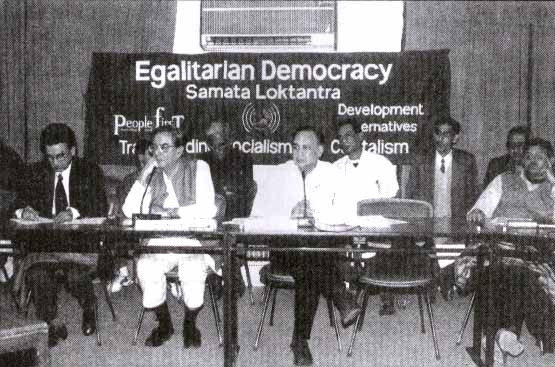| Egalitarian Economic System: A Panel Discussion | ||||||
|
People First |
||||||
An egalitarian economic system in which all have equal social, economic and political rights and opportunities can be realised only through effective grassroots empowerment. People First presented such a vision through illustrations. A lively debate followed. With the intention of clarifying doubts, Dr Gautam Vorha, representing Development Research and Action Group and the NGO Club, raised some basic issues on behalf of the participants. These are answered below. People First invites more responses from citizens on its website (www.peoplefirstindia.org). NGO Issue 1: The objective is noble but is full of pitfalls. Solution proposed is creation of empowered village republics that control local resources and decision-making. But how is this utopian state to be achieved? People: You may call it utopian, but it is our rightful democratic right. You cannot have democracy for yourself and deny it to us. You will keep us illiterate and then say that we are morons, incapable of managing our local matters. Since you are denying these rights to us, we have taken to the gun and will increasingly do so in future. NGO Issue 2: You say that reforms can be instituted through referendum. To cite tiny Switzerland – a small relatively homogenous society with almost total literacy, is illusory. To hint that a country of India’s continental proportions with diversity of cultures, ethnic and religions divide, not to mention the two nations of the rich and the poor, can participate in a referendum, is ridiculous.
People: Now, you are being smart. It should be obvious to anyone that the common people, literate or illiterate, of all cultures, ethnicity and religions will vote for local empowerment and express their diversity through it. Only the miniscule political and educated elite, benefiting from exploitative centralised systems, will oppose it. In a referendum, the vote will clearly be over 80 percent in our favour. You know this and therefore cunningly want to deny us our intrinsic democratic right to referendum. NGO Issue 3: Statements such as equal economic rights and equal political rights are slogans and just that. These remind one of Indira Gandhi’s "garibi hatao" to retain power. Slogans in the absence of institutional framework that will translate the ideas into reality are empty rhetoric. People: We agree. That is why we are talking of an institutional framework that is responsive to this concern. That cannot be achieved through a diktat. We need to establish a dialogue and resolve it through referendum. The problem is you —- the educated, who feel threatened by referendum and are finding reasons to deny it to us. NGO Issue 4: Tell us how equal economic rights are to be attained. Do you want to do away with private property? For only then can you have a level playing field and everyone will have equal opportunity to start a business or industry and to secure employment. Even if property differentiation is done away with, people will differ in talent and ability and some will steal a march over others. We will then have the same situation as before —- some having more than the others. People: We are not talking of equal wealth but of reasonably equal opportunity for education and self-development, capable of making youth from poor families human beings similar to those from rich families. Grassroots empowerment is the only solution. It will generate values that regard material wealth as a product for societal happiness, not personal aggrandisement. A tricky issue is inheritance. It needs moderation. State interventions have proved counter-productive. A possible solution is that, under the law, inheritance exceeding a stipulated norm, shall vest in a Public Trust promoted preferably by the family that will be entitled to certain reasonable benefits from the Trust. Such Public Trusts will support social concerns to which the state is generally insensitive. Public Trust Commissions can monitor such Trusts. Such concepts will have to be studied and properly detailed out. q |
